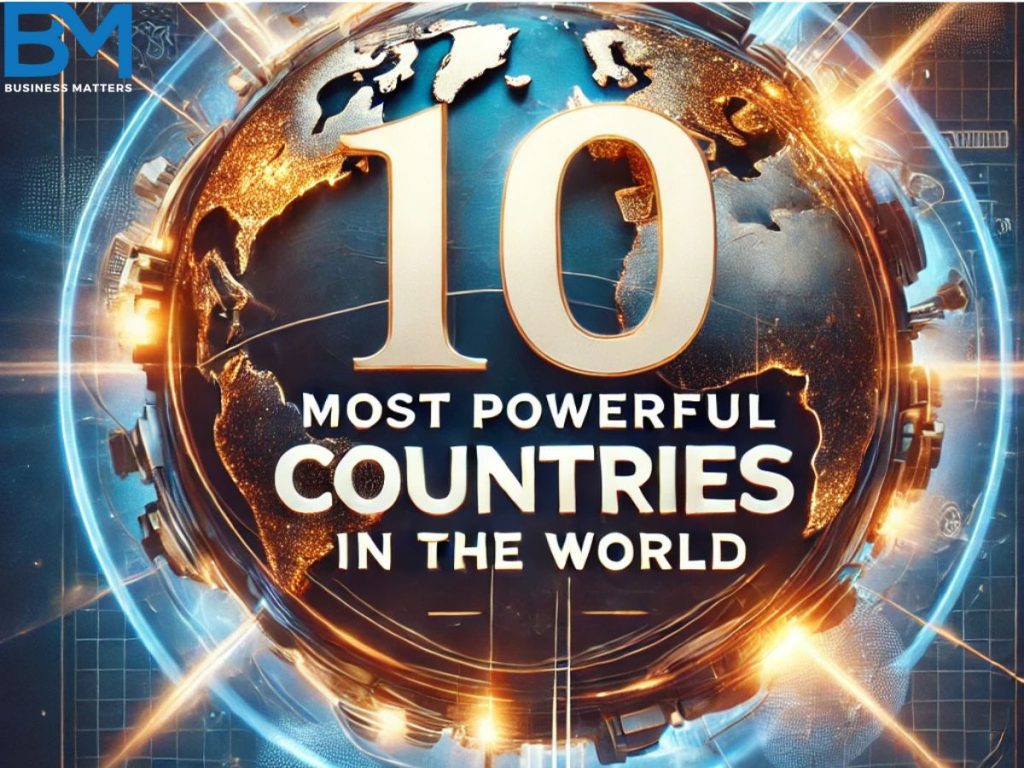In a world characterized by dynamic shifts in power, the year 2025 brings a nuanced picture of global influence. Power in the modern era is not solely about military but also economic strength, technological advancements, diplomatic influence, and cultural reach. Below, we explore the world’s top 10 most powerful countries for 2025, analyzing their strengths and contributions to the global landscape.
1. United States
The United States will continue to hold its position as the world’s most powerful country in 2025. Its dominance is rooted in a combination of factors:
- Economic Might: The U.S. remains the largest economy, with a GDP exceeding $25 trillion, bolstered by innovation in sectors like technology, healthcare, and green energy.
- Military Superiority: With an annual defense budget surpassing $800 billion, the U.S. maintains unparalleled military capabilities, including advanced nuclear weapons, a vast naval fleet, and cutting-edge drone technology.
- Technological Leadership: Home to tech giants such as Apple, Google, and Tesla, the U.S. drives global innovation in artificial intelligence, quantum computing, and biotechnology.
- Cultural Influence: Hollywood, global brands, and the prevalence of the English language ensure that American culture continues to shape global trends.
- Diplomatic Clout: As a permanent member of the United Nations Security Council and a leading member of NATO, the U.S. plays a pivotal role in shaping international policies.
2. China
China solidifies its position as a global superpower in 2025, leveraging its vast resources and strategic planning:
- Economic Growth: China’s economy remains the second-largest, with a GDP nearing $20 trillion, driven by manufacturing, technology, and a growing consumer market.
- Military Expansion: The People’s Liberation Army (PLA) continues to modernize, with significant investments in hypersonic missiles, cyber warfare, and space exploration.
- Belt and Road Initiative: This ambitious infrastructure project extends China’s influence across Asia, Africa, and Europe, fostering economic dependencies.
- Technological Advancements: Dominance in 5G networks, renewable energy technologies, and AI research places China at the forefront of global innovation.
- Soft Power: Chinese culture, through cinema, cuisine, and Confucius Institutes, is increasingly visible worldwide.
3. India

India‘s ascent as a major power is undeniable in 2025, thanks to its demographic dividend and economic growth:
- Economic Surge: India’s GDP surpasses $5 trillion, making it the world’s third-largest economy. Key sectors include information technology, pharmaceuticals, and renewable energy.
- Strategic Military: With the fourth-largest military and nuclear capabilities, India ensures its strategic autonomy in South Asia.
- Space Achievements: The Indian Space Research Organisation (ISRO) continues to make headlines, launching satellites and missions to Mars and the Moon.
- Demographic Power: With a population exceeding 1.4 billion, India boasts a young and skilled workforce.
- Global Influence: As a leader in the Global South, India’s voice in international forums like the G20 and BRICS is growing.
4. Russia
Despite economic challenges, Russia remains a formidable power in 2025:
- Military Prowess: Russia retains one of the world’s largest nuclear arsenals and is a leader in military technology, including advanced missile systems.
- Energy Dominance: As a top exporter of natural gas and oil, Russia wields significant influence over global energy markets.
- Geopolitical Influence: Russia’s assertive foreign policy in regions like Eastern Europe, the Middle East, and Africa underscores its strategic ambitions.
- Technological Focus: Investments in AI, cybersecurity, and space technology enhance Russia’s global standing.
- Cultural Legacy: Russian literature, ballet, and classical music continue to contribute to its soft power.
5. Germany

Germany leads Europe as an economic and diplomatic powerhouse in 2025:
- Economic Strength: With a GDP exceeding $4.5 trillion, Germany is Europe’s largest economy, driven by its automotive, engineering, and green energy industries.
- Technological Edge: Investments in artificial intelligence, robotics, and sustainable technologies ensure Germany’s competitiveness.
- European Leadership: As a key player in the European Union, Germany shapes policies on trade, climate change, and migration.
- Cultural Influence: German art, music, and philosophy continue to inspire global audiences.
- Diplomatic Role: Germany’s commitment to multilateralism enhances its international reputation.
6. United Kingdom
The United Kingdom maintains its influence through a blend of history and modern strategy:
- Economic Resilience: The UK remains a global financial hub, with a GDP of over $3 trillion supported by industries like finance, healthcare, and technology.
- Military Reach: The UK’s military includes a robust navy and nuclear deterrent, reinforcing its global commitments.
- Cultural Clout: British literature, music, and media continue to have a global impact.
- Diplomatic Influence: As a permanent member of the UN Security Council and a key NATO ally, the UK remains integral to global security.
- Scientific Innovation: Cutting-edge research in biotechnology and clean energy underscores the UK’s contributions to global challenges.
7. France

France’s influence in 2025 is rooted in its rich heritage and forward-looking policies:
- Economic Stability: With a GDP of around $3.5 trillion, France’s economy thrives on luxury goods, aerospace, and tourism.
- Military Strength: A robust nuclear arsenal and active participation in NATO ensure France’s strategic security.
- Cultural Prestige: French fashion, cuisine, and art dominate global culture.
- Global Leadership: France plays a leading role in the European Union and international organizations, advocating for climate action and human rights.
- Technological Drive: Advances in space exploration, nuclear energy, and AI bolster France’s global position.
8. Japan
Japan’s blend of tradition and innovation secures its position among the world’s most powerful countries:
- Economic Power: Japan’s GDP exceeds $4 trillion, with strength in automobiles, electronics, and robotics.
- Technological Leadership: Pioneering work in robotics, renewable energy, and healthcare technology underscores Japan’s innovative spirit.
- Military Modernization: Japan’s Self-Defense Forces benefit from advanced technology and strong alliances, particularly with the U.S.
- Cultural Influence: Anime, manga, and Japanese cuisine enjoy global popularity, enhancing Japan’s soft power.
- Diplomatic Role: Active participation in international forums and peacekeeping efforts highlights Japan’s commitment to global stability.
9. Brazil

Brazil emerges as a leading power in the Global South in 2025:
- Economic Growth: Brazil’s diverse economy, with strengths in agriculture, mining, and renewable energy, drives its GDP to over $2 trillion.
- Natural Resources: As a top exporter of soybeans, iron ore, and coffee, Brazil wields significant influence in global trade.
- Environmental Leadership: Efforts to preserve the Amazon rainforest and invest in green energy position Brazil as a key player in global sustainability.
- Cultural Impact: Brazilian music, dance, and sports captivate audiences worldwide.
- Regional Influence: As the largest country in South America, Brazil shapes regional policies and trade agreements.
10. South Korea
South Korea’s rise as a global power in 2025 reflects its resilience and innovation:
- Economic Dynamism: With a GDP approaching $2 trillion, South Korea excels in electronics, automobiles, and entertainment.
- Technological Innovation: Companies like Samsung and LG drive advancements in semiconductors, 5G, and AI.
- Military Strength: A modernized military and strategic alliances enhance South Korea’s security.
- Cultural Dominance: The global popularity of K-pop, Korean dramas, and cuisine amplifies South Korea’s soft power.
- Diplomatic Role: Active engagement in international diplomacy underscores South Korea’s commitment to peace and development.
Conclusion
The top 10 most powerful countries in 2025 showcase a diverse array of strengths, from economic and military capabilities to cultural and technological influence. As the world evolves, these nations will continue to shape global trends, policies, and innovations. Their ability to adapt to challenges and seize opportunities will determine their standing in the years to come.


